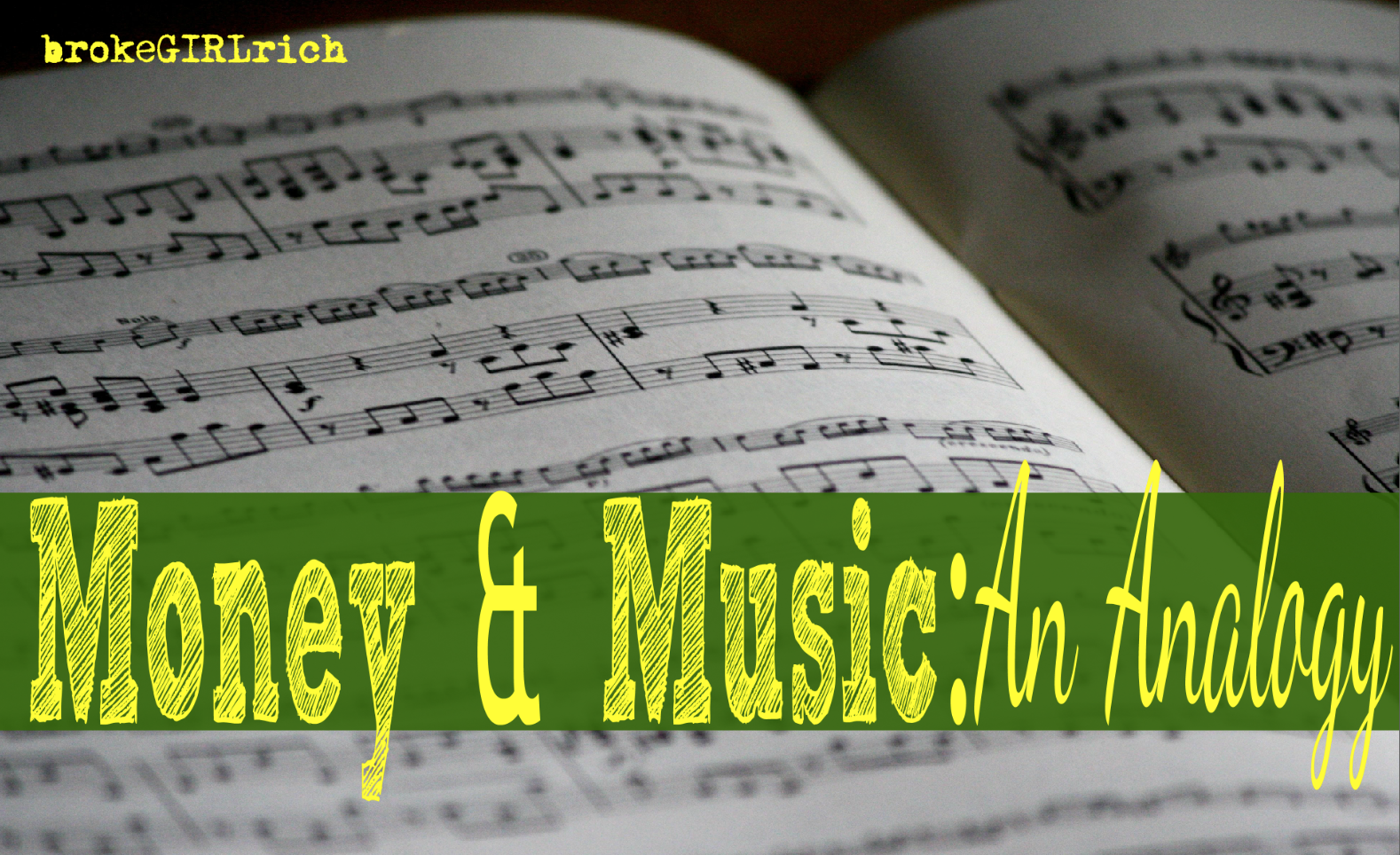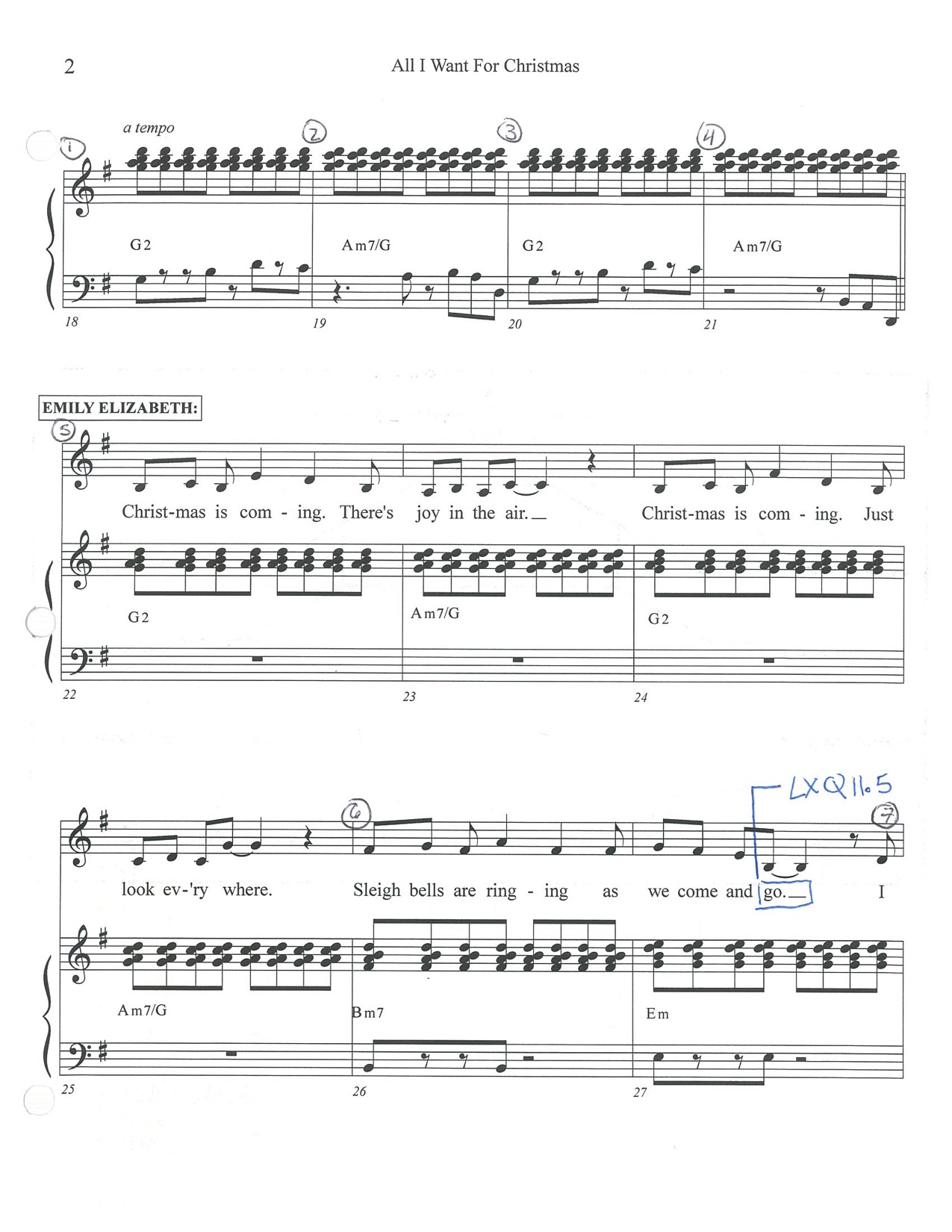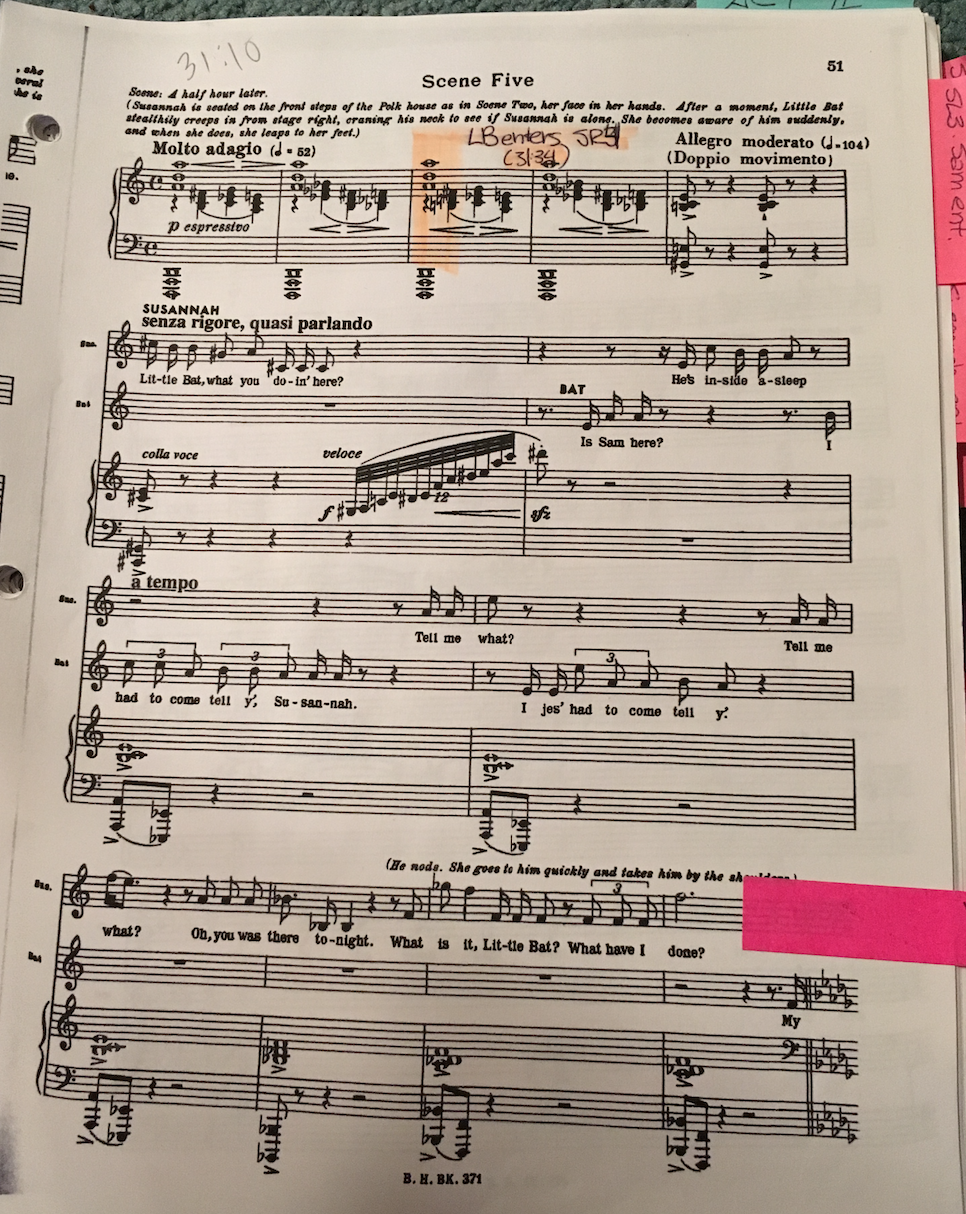
Money & Music: An Analogy | brokeGIRLrich
Not that long ago, I interviewed with an opera company that sent me part of a score and asked me 8,000 (or what felt like 8,000) questions about it over the phone as part of my interview to prove I could read music.
I stumbled through the entire interview.
I did not get the job.
Reading music is a pretty common stage management skill. On the last few musicals I’ve done, they’ve been splits pretty 50/50 with my prompt books just having some lyrics in them or having full sheet music – and I’ve made a few Frankenbooks too that use both (cause if you have a light cue at the top and bottom of the song, do you really want to flip through 12 pages of sheet music when the lyrics and a little note about how many measure to count after the lyrics or what dance move to look for will suffice for the bump out?).
I’ve started to call this music reading light.
Here’s an example of music reading light:

Not only is it super clearly written out, it’s only the melody and I feel like a halfway talented junior higher could probably play down this music.
Additionally, as the calling stage manager, I can stare at this thing pretty much the whole way through with half an eye on the stage, even just a quarter of an eye, if I have to while I’m learning how to call the show.
Here’s an example of what I’m calling regular music:

Not only is convoluted with multiple lines, but as an ASM, you are literally running around the entire stage, grabbing people and getting them set for exits, prop hand-offs, etc. You need to be able to hear where you are in the music and just look at the page and be able to find it.
And a ton of opera is just instrumental. People are not singing every second.
Here’s why I thought I could get the job:
At 8, I started playing trumpet, like every other kid in the school district. At 12, when they let you add a second instrument, I piled on the French horn too. By high school, I was probably playing 3 hours a day in every band the school offered and on weekends during marching band season.
I went to college and started out as a music major, played in the bands at school, and sometimes got paid to play in the local high school pit bands for their school plays when I was in college. I took (and freaking got an A in) music theory and classes in jazz analysis.
It is hard ingrained in my head that I can read music. In my sleep.
At 20, when I fully transitioned into theater and stage management, I stopped playing.
For several years after that, whenever I came across sheet music at work, I could read the heck out of it – absolutely no issues.
Time passed, I worked a ton of shows that didn’t require reading any music or I was reading music light and increasingly pretty much reading the lyrics instead of the music, without even realizing it.
Until this stupid opera company interview, where I was all “of course I read music” and turns out… not really.
So, how does this relate to personal finance, right?
Well… everything kind of does 😉 But here’s the connection I’m making:
When I started out my personal finance journey, I attacked it with everything I had. I started reading books, blogs, and magazines about personal finance (like going to lessons). I aggressively paid down my debts (marching band). I started saving up my emergency fund (jazz band). I started contributing to retirement accounts (wind ensemble). I set budgets for big spends like my travel plans (pit orchestra). I started tracking my net worth (music theory classes). I set concrete goals I wanted to achieve and made plans to get there, no matter how many years it was going to take (jazz analysis classes).
I was buried in personal finance. My identity became “someone who is good at personal finance.”
I mean, that’s still my identity.
But full disclosure, in my head, so is band geek, and as we’ve assessed, it’s been about 15 years since I played an instrument regularly.
I’ve felt the last few years that a lot about my finances are on autopilot. I’m out of debt. My emergency savings fund is fully saved. I’m creeping toward some big savings goals that don’t have concrete dates I even need the money by. With the addition of the inheritance from my mom, this past month I officially realized (and yes, I know how douche this sounds), I have more money than I know what to do with.
- I’m not nearly as involved in the overall blogger scene as I used to be. I mostly just write my posts and go about my day.
- When I want to travel, I just go.
- When I want to splurge, I just do.
So anyways, each year, I make a list of goals to achieve and I actually have an overlapping one this year. Almost every year, I put build two skills/certifications for work. This year though, I added “take music lessons.”
Now, the odds of me being able to make it to something as regular as a music lesson have always deterred me from chasing my music goal. Touring and music lessons don’t really go together.
But I haven’t really been touring in 2019 and starting in May, I went to my first music lesson in 14 years.
I sounded like a dying cow.
I cannot slur eighth notes.
Fast tempos and weird time signatures make me want to throw the music books across the room.
I’m currently defining weird as anything other than 4/4 or 3/4.
But after even just one month, I see and feel a difference (I now accept 6/8 without my brain exploding too).
I got very, very lucky and realized that my music teacher is pretty awesome. He’s a retired public school music teacher and I’m his only adult student at the moment and at first I thought he was a sadist because like, who gives this insane quantity of surprisingly difficult exercises to a beginner when she said she was just taking lessons so she can learn to read music better for work again? I realized this past week that I think he does expect me to fail my way through 90% of every lesson.
He gives me these exercises that are much too hard and I can barely get through them and they sound terrible and then he pushes me on to the next page the following week anyway. I spent the entire last month thinking WTF.
Then on a whim while I was practicing this week, I flipped back to the first page, which I really couldn’t get through a month ago, and played it totally fine.
I see what you’re up to, sir.
It’s weirdly painful to struggle so much and sound so bad after so many years of working so hard to get it right, but I can also see a different path where it didn’t have to be this.
There was a brief period when switching between music and theater where I just played in one community band a few times a month.
I put in a tiny fraction of the original work, but I could still play and had no trouble reading music.
A little upkeep goes a long way.
I suspect if I had kept playing once in a while over the years, I would’ve read that stupid opera music just fine. And I wouldn’t have to go take lessons like an 8 year old again now.
And, additional personal finance side note, lessons are way more expensive than dues for community bands. Sigh.
So, if you spent a long time building your personal finance skills, keep vigilant! If you neglect them, you may think they’re still functioning well only to find you have totally lost all ability in the subject.
On the plus side, keeping vigilant doesn’t require the same amount of effort as the initial learning curve.
And if you’ve gotten too lax and forgotten how to use your skills, let me leave you with this encouraging tidbit:
I remember actually starting out on trumpet. There was a lot of Hot Cross Buns and Lightly Row. As I’m getting back into it again, I’m moving through lessons 10X as fast. Somewhere in my head is still most of the information I need.
My lip muscles need to practice so they can play for longer than 30 minutes without dying. My fingers need to practice because they keep on just not moving as fast between valves as I want them to.
But I’m not starting from scratch, so that’s nice. And if you’re rebuilding your personal finance skills, and they were pretty okay at one point, you probably won’t be starting from scratch either.




I know nothing about music but even I could follow your logic. I make a point to read at least one finance, frugal living blog 5 days a week. This keeps my brain trained. Use it or lose it as they say.